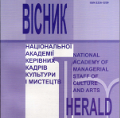Міжмистецька теорія модернізму: роздуми над книгою Олени Корчової «Музичний модернізм як terra cognita»
Inter-artistic theory of modernism: reflections on the book by Elena Korchova "Musical modernism as terra cognita"
Author(s): Mariia Vasylivna MoklytsyaSubject(s): Music, Semiology, Aesthetics, Marxism, Philosophy of Language, Philology
Published by: Національна академія керівних кадрів культури і мистецтв
Keywords: modernism; epoch; style; impressionism; symbolism; expressionism; futurism; surrealism; neoclassicism;
Summary/Abstract: The purpose of the article is to analyze the theoretical aspect of the concept of musical modernism O. Korchova, to identify debatable aspects important for the creation of the inter-artistic theory of modernism. Methodology: used historical, cultural, and comparative methods, with the involvement of philosophy and psychology. The scientific novelty of the study is that the musicological concept of modernism is compared with the literary, which proves the need to create an inter-artistic theory of modernism, necessary in the practice of stylistic analysis of modernist works. Conclusions. An important achievement of O. Korchova's research is the search for a "stylistic formula" of each composer of the epoch. The artist is looking not just for a consonant style or form, but for himself and his style. Individual style does not arise from simple combinations of borrowed. Styles of modernism conflict with each other, to combine them, to avoid eclecticism, you need to find a way and a reason to combine. The way to find your style is never purely artistic, it is always vital. Modernists, putting art in the first place in aesthetics, discovered the concept of life creation, which distinguishes the modernist from the artists of previous eras. Life-creation is a special way of an artist into art, movement simultaneously in two dimensions, external and internal, their constant coordination and gradual transformation of oneself, with life and works together, into a cultural phenomenon. And if this happened - then something unique was formed, unique, completely individual, and at the same time universal, something original and holistic, something that will become a value for contemporaries and descendants, that is, the author's style. Just as it is not easy for every artist to find his style, so it is not easy for a researcher to find a formula for this style. But without such a goal, the study of creativity will be historiographical, descriptive, and rhetorical. It is important for every scholar who studies specific texts of culture to understand the trends of the era and the psychology of the creative process, all the laws that unite.
Journal: Вісник Національної академії керівних кадрів культури і мистецтв
- Issue Year: 2021
- Issue No: 3
- Page Range: 152-160
- Page Count: 9
- Language: Ukrainian

